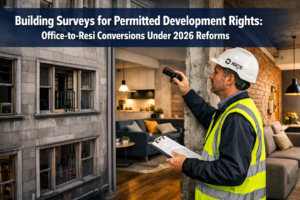Dilapidation Surveys
As a landlord of a commercial property, you must ensure your tenant is legally accountable for any damage they cause to the property during their occupancy. The tenant’s legal responsibility for the damage—that is, the tenant’s legal duty to keep the property in good repair—means that any repairs for which the tenant is responsible are called dilapidations.
What is a Dilapidations Survey?
Prior to the start date of the lease, it is advisable to employ the services of an RPSA, CIOB or RICS Chartered Surveyor to complete a Schedule of Condition. This document lays out the current state of the property at the time of the commencement of the lease.
In the closing months of the lease, if you are a landlord, you may wish to consider getting a dilapidations survey completed to assess whether your tenant has made any alterations to the property that are meriting of returning the property to its original condition. Alternatively, if you are a tenant who has received a Schedule of Dilapidations (the document that lists the works you’re required to do to avoid forfeit of your security deposit), you can employ the services of a Chartered Surveyor to conduct a dilapidations survey for you if you think the claims are unfair.
Advantages of Dilapidations Surveys for Landlords
There are several reasons why a landlord would find a dilapidations survey beneficial.
Responsibility: the survey helps ensure that a tenant is held accountable for repairs resulting from damage or alterations made during their tenancy.
Reduce Loss: the survey helps protect your potential for financial loss after a tenant vacates. It assesses the condition of the property to ensure all reasonable and necessary repairs that have been omitted during the lease term are paid for by the tenant. Otherwise, your potential for financial loss is much greater.
Insight: the survey helps give you the ability to look deeper into the condition of your property after a tenant moves out but before the next tenant moves in. The condition that your property is in that could affect your chances of re-renting the property.
Benefits of Dilapidations Surveys for Tenants
Here are some advantages of having a dilapidations survey performed for you, the tenant.
Savings: your landlord can seek compensation from you for both the financial outlay and the actual work involved in putting the defects back into the condition required by the lease. Getting a well-priced survey done at the front end can save you tens of thousands of pounds compared to surveying the building after it’s been handed back over.
Controlling Repairs: if the survey shows that there are repairs to the premises that must be made, it is up to you to make those repairs yourself or via your contractor, which might be less expensive than your landlord using their own contractor.
Avoiding Disputes: the fewer disputes there are during the transition period at the end of the lease, the better. Your surveyor can assist you in resolving conflicts outside of the courtroom through Alternative Dispute Resolution (ADR) such as mediation. Using this method, you can obtain a resolution to your problem without having to go through the lengthy and expensive process of a court trial.
How does a dilapidation claim work?
Dilapidation assessments are mainly carried out on behalf of landlords, but they can also serve tenants who want to negotiate more favourable lease terms.
A surveyor will inspect the condition of the premises before and at the end of a lease, covering the condition of the property. The state of the premises at the end of the lease serves as a valuable record for landlords when they negotiate another lease with a subsequent tenant. To make a claim against a tenant, a landlord must have a surveyor prepare a Schedule of Dilapidations, which lays out the condition of the premise at the end of a lease, sets out any damages, and gives approximate costs for any necessary repairs.
Landlords can not make a profit when they issue a Schedule of Dilapidations to tenants. They can only claim money to reimburse them for the cost of the repairs or any other sorts of financial losses that they incur because the tenant has not properly maintained the property. This amounts to the following types of loss:
fixing damage done to the property or nearby properties
paying professional fees
cleaning up ground contamination
compensating for lost rent and/or service charges due to repairs
paying for damage to the reversion caused by the property’s dilapidations
When the tenant’s lease is expiring, the surveyor will also enquire about your plans for the property. If you’re contemplating major changes or alterations to the property, the surveyor is going to suggest that the tenant not be made responsible for those costs. For instance, if you are planning significant changes to the property, the tenant should not be responsible for those costs and should therefore not have been charged for them in your Schedule of Dilapidations. You have to be fundamentally honest with the tenant about your plans. If you don’t and the tenant finds out, they have the right to come back to you, complain, and recover any costs that were unfairly charged to them in the first place. Whether you’re on the landlord side of this question or the tenant side, we can advise you on what your rights and responsibilities are.
Is a Dilapidation Survey What You Need?
Deciding whether a dilapidation survey is necessary is where we can best assist you. Our panel of specialists in the field can provide you with independent and impartial advice about your situation. We have experts who have worked successfully on both sides of the issue: landlords and tenants. Whether you are one or the other, our surveyors can help you reach a reasonable and amicable solution without going to court. Please reach out to us, and we can get started helping you right away.

Surveys of Commercial Property
If you’re thinking of acquiring, leasing, subletting, disposing of, or altering commercial premises in Manchester, you would be well advised to locate a surveyor skilled in the nuances of commercial building surveying – should you spot a defect in a commercial building you can use that information to negotiate an asking price for the property that’s considerably lower than what the seller originally wanted, or you can talk your way out of a bad deal altogether.
Our Manchester-based team of RICS-compliant commercial building surveyors is equipped to handle matters throughout Manchester.
Contact
Our team prioritizes client care above all else. We look forward to being in touch with you so you can instruct a surveyor in Manchester, London, Bristol, Birmingham or Cardiff. You can reach out to us easily. Just fill out our form, and we’ll get back to you with a free quote for your survey. All our surveyors are qualified as members of the Royal Institution of Chartered Surveyors (RICS) and we are one of the UK’s leading providers of building survey and valuation services:
- Accredited Professionals: Certified by organizations like RICS, CIOB, and RPSA.
- Customized Survey Reports: inspections to meet your specific requirements.
- Local Expertise: Deep understanding and specialized knowledge.
- Expert Guidance: Professional recommendations and support.
The property survey you commission will be carried out by an accredited professional. Your chartered surveyor will be a member of the Royal Institution of Chartered Surveyors (RICS) or the Chartered Institute of Building (CIOB), or will belong to some other industry-standard professional body. Rest assured; you will receive highest quality of professional service for your survey.














